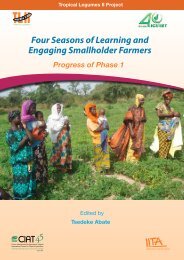Four Seasons of Learning and Engaging Smallholder Farmers - icrisat
Four Seasons of Learning and Engaging Smallholder Farmers - icrisat
Four Seasons of Learning and Engaging Smallholder Farmers - icrisat
Create successful ePaper yourself
Turn your PDF publications into a flip-book with our unique Google optimized e-Paper software.
utilization <strong>and</strong> marketing. In Nigeria a total <strong>of</strong> 567 farmers <strong>and</strong> 37 extension agents have been trained<br />
in seed production technology, <strong>and</strong> agronomic practices, segregation, st<strong>and</strong>ard, processing, storage<br />
<strong>and</strong> marketing.<br />
A total <strong>of</strong> 230 farmers <strong>and</strong> 120 extension agents have been trained in Kenya on seed production<br />
technology <strong>and</strong> management practices <strong>of</strong> which 26% were women. In Mozambique, 482 farmers <strong>and</strong><br />
40 extension agents have been trained.<br />
Lessons learned<br />
TL II soybean seed systems Phase 1 lessons are listed below.<br />
1. Building a strong effective partnership for widespread success: to deliver improved soybean<br />
varieties <strong>and</strong> production technologies require diverse partners in addition to the usual National<br />
Agricultural Research Institutions;<br />
2. Complementary crop management technologies: Complementary crop management practices<br />
that contribute to increased yield promoted alongside improved crop varieties are two<br />
components to increase productivity;<br />
3. A small pack marketing approach has the potential to reach hundreds <strong>of</strong> thous<strong>and</strong>s <strong>of</strong> farmers,<br />
quickly. In both Nigeria <strong>and</strong> Niger, the sale <strong>of</strong> small packs has reached men <strong>and</strong> women farmers,<br />
<strong>and</strong> exp<strong>and</strong>ed the use <strong>of</strong> Certified Seed. It has also given farmers the opportunity to experiment<br />
new varieties at minimum risk. The small-pack model has already spread to other crops;<br />
4. Monitoring <strong>and</strong> evaluation have been crucial for underst<strong>and</strong>ing project opportunity <strong>and</strong><br />
constraints. Considerable energy was expended to develop <strong>and</strong> put in place for the Integrated<br />
Performance Monitoring <strong>and</strong> Evaluation (IPME) processes <strong>of</strong> the project <strong>and</strong> such start-up efforts<br />
should not be underestimated. IPME has also delivered quickly—especially in identifying some<br />
<strong>of</strong> the opportunities <strong>and</strong> weakness <strong>of</strong> the project;<br />
5. Milestones achieved varied among countries due to limited human capacity <strong>and</strong> resources <strong>and</strong><br />
commitment <strong>of</strong> partners; <strong>and</strong><br />
6. <strong>Four</strong> key factors, all concerning capacity building, played a significant role in TL II’s success.<br />
These included the development <strong>of</strong> strong partnerships, sometimes now referred to as<br />
innovation platforms, the use <strong>of</strong> participatory approaches, the strengthening <strong>of</strong> communitybased<br />
organizations, <strong>and</strong> the use <strong>of</strong> research knowledge. TL II promoted linkages <strong>and</strong> created a<br />
strong partnership between stakeholders. The project worked closely with State ADPs, providing<br />
training in PREA, as well as new agricultural technologies <strong>and</strong> management practices. This was<br />
undertaken in ways which reinforced each other based on the principles that people learn from<br />
practical experience <strong>and</strong> better from their peers.<br />
246<br />
<strong>Engaging</strong> <strong>Smallholder</strong> <strong>Farmers</strong> | Tropical Legumes II Project

















